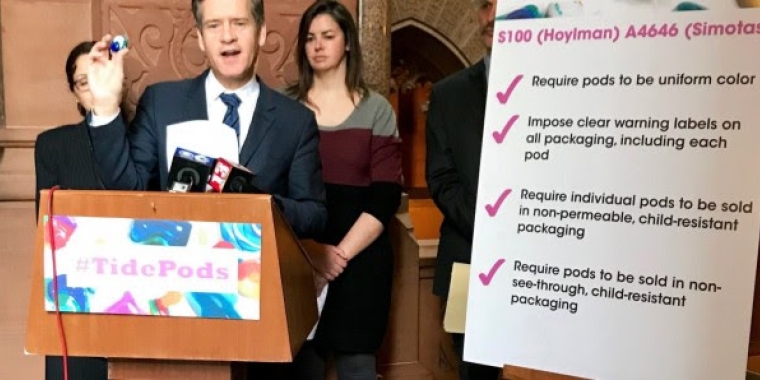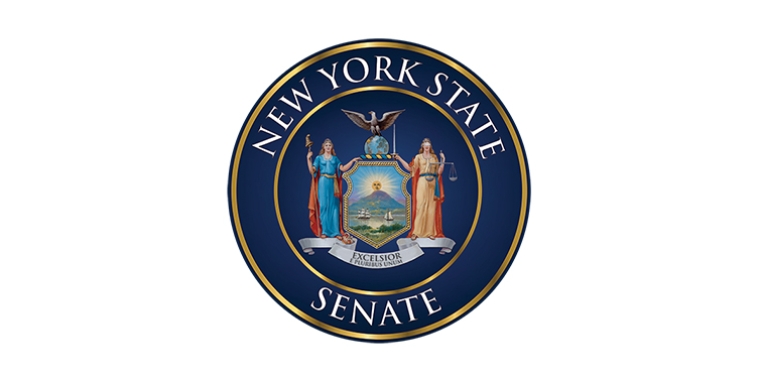
Proctor & Gamble Respond to Senator Hoylman and Assemblymember Simotas' Call to Overhaul Tide PODs
April 2, 2018

The following is the Senior Manager of State Government Relations The Procter & Gamble Company's written response to Senator Hoylman and Assemblymember Simotas' call to overhaul its colorful liquid detergent product "Tide PODs:"
Dear Senator Hoylman and Assemblymember Simotas:
Thank you for your recent letter to Procter & Gamble Chairman, President and CEO David Taylor. Nothing is more important to us than the safety of the people who use our products. We share your concerns about intentional misuse of laundry packets and reducing accidental exposure to these products. We have and will continue to take significant action to meaningfully reduce these incidents so that millions of people can continue to use our laundry packets safely every day.
P&G Actions to Reduce Accident Rates
We appreciate the continued dialogue with you on this topic. As I shared with you both in our conversations last May, P&G has taken a series of actions to ensure laundry packets are used properly and stored safely, including creating child-resistant packaging, enhancing the warning labels, leading the development of an ASTM industry safety standard, and launching education campaigns on safe use and storage with key partners. These measures have already meaningfully reduced accident rates. They include:
• Child-resistant packaging for both bags and tubs: All liquid laundry pacs manufactured by P&G today are in child-resistant packaging. P&G’s new Child-GuardTM tub was launched in 2017 with a harder-to-open, easy-to-close child-resistant closure. Our Child-Guard child-resistant bags, have been on store shelves since 2016.
• Bitter outer layer: We added a bitter taste to the laundry packet’s outer layer as an additional deterrent to accidental ingestion, upgraded the pod film so it dissolves more slowly to delay content release, and have enhanced the warnings on the product label.
• Safety education: P&G produced a safety-focused education campaign for Tide PODS, which was deployed across TV, print, and digital media to increase consumer awareness of the correct way to use and store these products safely.
• Key partnerships: We have partnered with Safe Kids Worldwide, the Alzheimer’s Association, and the American Cleaning Institute to educate parents and caregivers on the importance of keeping the product up, closed, and safe – away from children and vulnerable adults.
In addition to these actions related to our company’s products and packaging, P&G also co-led the development of a safety standard through ASTM, an international standards-setting organization. This effort brought together the U.S. Consumer Product Safety Commission, safety experts and advocates, poison control centers, medical experts, and other industry
partners to align on best practices to reduce accidents. The ASTM standard is now in effect, and calls for manufacturers to produce laundry packets according to clear guidelines:
• Liquid laundry packets must be sold in opaque packaging designed to make it more difficult for children to open;
• Primary packaging must contain warning information, standardized safety icons, and first aid instructions;
• Packets must have a bitter-tasting (aversive) agent on their outer film;
• Packets must meet enhanced standards for the amount of time it takes for the outer film to dissolve in water to delay the release of contents;
• Packets must have the ability to withstand the squeezing pressure of a young child.
This ASTM standard was published in December 2015 and fully implemented by all major manufacturers of liquid laundry packets prior to January 1, 2017. P&G’s liquid laundry packet products sold in the U.S. have been fully compliant with the ASTM standard since April 2016. We look forward to sharing data on accident reduction in the first year of the ASTM standard’s implementation when it is available later this year. We believe it will show continued progress.
Proposed New York Legislation
The proposed legislation would require manufacturers to take four specific actions to be allowed to sell liquid laundry packets in New York. As noted above, P&G has already implemented two of the requirements in your bills – child-resistant packaging and warning labels. I would like to address the other two requests, individual wrapping of packets and uniform packet color, in more detail.
Individual Wrapping
P&G’s research team has studied individual wrapping extensively. Our studies have shown that individual wrapping would not be helpful in reducing accidents and may have significant unintended consequences. Individual wrapping is commonly used for snacks, which could cause confusion for consumers or children who are unfamiliar with the detergent product. Further, difficult-to-open wrapping results in unintended consequences, as consumers often use scissors or their teeth. These actions could actually increase accidental ingestion or eye or skin exposure. We are also conscious of the potential environmental impact of this package choice. The legislation specifically calls for each packet to be sold in a “child-resistant” wrapper. It is unclear to what specific packaging technology this refers. All our liquid laundry packets are sold in child-resistant primary packaging, which is the most effective way to reduce access and accidental exposure to small children.
Uniform Packet Color
According to a study of data from U.S. poison control centers, color does not play a critical role in a child’s accidental exposure to laundry packets. In this report, the primary driver of accidental exposures was the availability of the product to young children, which is why we developed and launched child-resistant packages and have focused our educational efforts on the importance of keeping the product closed and out of the reach of children. It is unclear if the proposed legislation calls for packets on the market to be one specific color, or simply uniform in a single color within a package. P&G currently offers laundry packet choices including all-white packets (Tide Free and Gentle) for families who may prefer a product without color or scent. Which product to use – whether packet, liquid or powder – is always the choice of the consumer based on the needs of their household.
Intentional Misuse of Liquid Laundry Packets
We are deeply concerned about the intentional misuse and ingestion of liquid laundry packets by young people engaging in self-harm challenges. We’ve taken steps to help stop these dangerous activities. We launched a social media campaign with Tide spokesman Rob Gronkowski and we are continuing to work with social media platforms to remove harmful
content that is not consistent with their policies. We have worked with a variety of national education-focused organizations to provide them with information and materials to share with their members about the dangers of intentional misuse of the product. David Taylor also shared his personal perspective on the dangers of intentional misuse on P&G’s blog noting that, “... even the most stringent standards and protocols, labels and warnings can’t prevent intentional abuse fueled by poor judgment and the desire for popularity.” We continue to monitor the situation closely in partnership with the CPSC and other stakeholders.
Conclusion
Like you, I am the parent of a young child, and nothing is more important to me than the health, safety, and well-being of my son. P&G has consistently taken actions to ensure that our liquid laundry packets are safe when stored and used as directed. Parents like us can use these products with confidence. I appreciate the opportunity to continue the dialogue we started last year and hope we can work together on measures that will continue to meaningfully reduce accident rates. We share the same goal and I am confident that working together we can build on the progress we’ve made.
With best regards,
Mike Prentiss
Senior Manager, State Government Relations
The Procter & Gamble Company
Additional information on Tide’s safety efforts is available here.
related legislation
Share this Article or Press Release
Newsroom
Go to Newsroom

H.E.L.P. (“Harness Expertise of Licensed Professionals”) Act
November 19, 2024

Letter to NYS DOT on Route 9A
November 8, 2024
